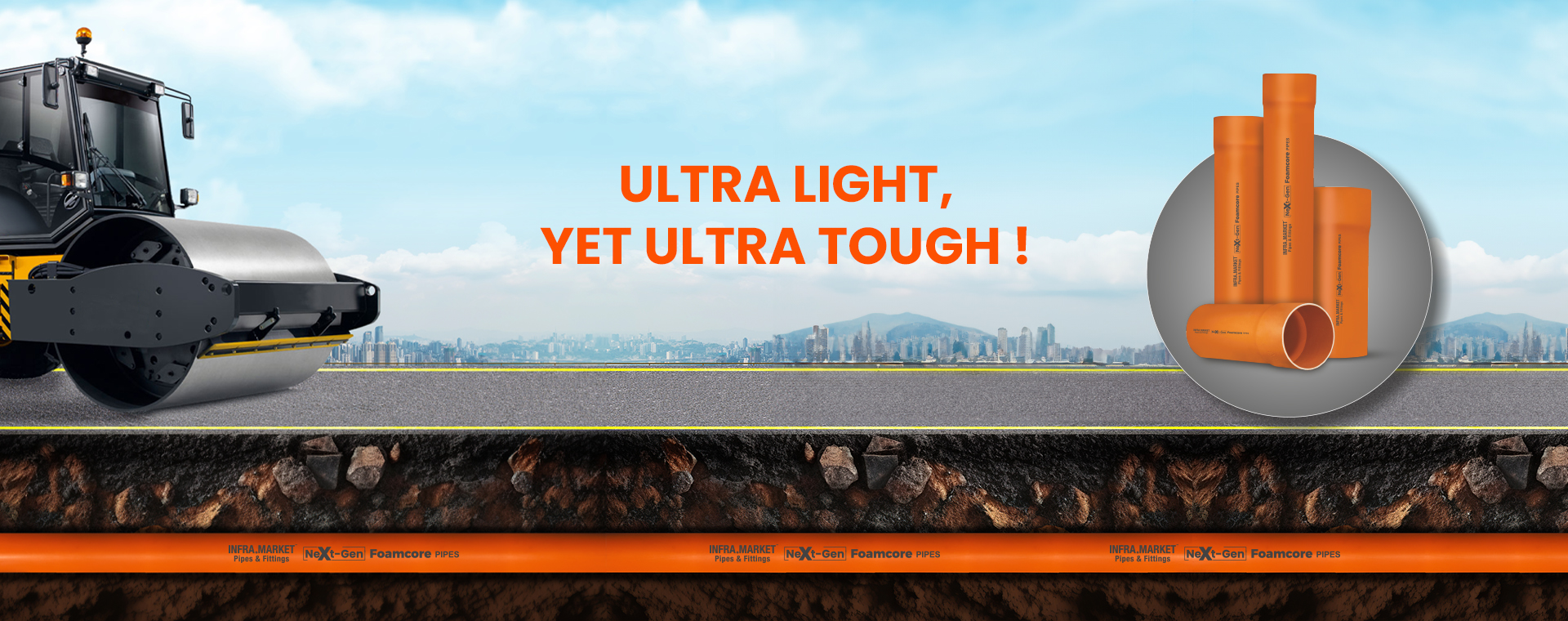Introduction
Next-Gen Foamcore pipes are manufactured using multi-layer extrusion technique. Infra.Market's Next-Gen Foamcore pipes consist of three layers, having inner and outer layers of PVC and middle layer consisting of foamed PVC. Outer and Inner layers serve the purpose of Load bearing and chemical resistance, where as the middle layer of foam gives rigidity and maintains the shape of the pipe under load. Inner foamed layer not only provides superior ring stiffness but also reduces the total weight of the pipe when compared with standard solid wall UPVC pipe. Due to lighter weight handling and installation of Next-Gen Foamcore pipes are easier and faster than other alternative pipes available for similar application.
RUBBER RING JOINT PIPES

Rubber Ring Joint pipes are socketed on the automatic online socketing machine with a very high degree of accuracy. The socket has groove inside for rubber ring. The rubber ring ensures trouble-free watertight joint with allowance for thermal expansion/contraction. One end of the pipe is chamfered for smooth insertion and another is self socketed with an integral groove to hold the rubber ring. When joined with a rubber ring, the joint formed is a trouble-free, water tight, ready to take care of thermal expansion/contraction.
Available Sizes
SOLVENT JOINT PIPES

Solvent Joint pipes are socketed on the automatic socketing machine with self socket length (without groove). Such pipes are to be joined with solvent cement. One end of the pipe is chamfered for smooth insertion and the another is self socketed on sophisticated automatic machines for a high degree of accurate diameters. When joined using solvent cement, the pipes form a permanent watertight joint.
Available Sizes
Pipes Available in Both Types of Solvent Joints and Rubber Ring Joints
Excellent Mechanical Properties
Corrosion Proof
Leak Proof and High Impact Strength
Friction Free Due to Smooth Inner Surface

Benefits 1

Benefits 2
Our Next-Gen products, including PVC, CPVC, OPVC, and HDPE pipes and fittings, stand at the forefront of technology. They not only exemplify our commitment to excellence but also address the evolving needs of the plumbing, drainage, and agricultural sectors.

IS:16098 (Part-1)
| Nominal Size (Outside Diameter) | Mean Outside Diameter | Ring Stiffness | ||||||
| SN 2 (SDR 51) | SN 4 (SDR 41) | SN 8 (SDR 34) | ||||||
|---|---|---|---|---|---|---|---|---|
| Minimum | Maximum | Minimum | Maximum | Minimum | Maximum | Minimum | Maximum | |
| (mm) | (mm) | (mm) | (mm) | (mm) | (mm) | (mm) | (mm) | (mm) |
| 110 | 110 | 110.4 | - | - | 2.7 | 3.2 | 3.2 | 3.7 |
| 160 | 160 | 160.5 | 3.2 | 3.7 | 4 | 4.6 | 4.7 | 5.4 |
| 200 | 200 | 200.6 | 3.9 | 4.5 | 4.9 | 5.6 | 5.9 | 6.7 |
| 250 | 250 | 250.8 | 4.9 | 5.6 | 6.2 | 7 | 7.3 | 8.3 |
| 315 | 315 | 316 | 6.2 | 7 | 7.7 | 8.7 | 9.2 | 10.4 |
Download the brochure for more information


